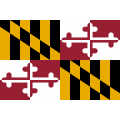For our 2024 rankings, the research team at Nursing Schools Almanac collected data on nearly 3,000 nursing schools and campuses throughout the United States. We evaluated each school on three dimensions:
Maryland
We've organized a comprehensive list of Maryland nursing schools. Below you'll find information on specific nursing programs such as LPN certificates and ADN, BSN, and MSN degrees. You'll also find a profile of nursing education and careers in each major Maryland city.
Maryland nursing programs and careers
Baltimore’s nursing profession has four distinct roles: certified nursing assistant (CNA), licensed practical nurse (LPN), registered nurse (RN), and advanced practice registered nurse (APRN). Responsibilities, education, and compensation vary significantly by role.
For our 2024 rankings of prelicensure BSN programs, the research team at Nursing Schools Almanac compiled an extensive database of student performance on the National Council Licensure Examination for Registered Nurses (NCLEX-RN). Aspiring registered nurses in the United States must pass this examination before they may commence practice. Thus, student performance on the NCLEX-RN exam provides an excellent benchmark for comparing the relative quality of bachelor’s degree programs.
For our 2024 rankings of ADN programs, the research team at Nursing Schools Almanac compiled an extensive database of student performance on the National Council Licensure Examination for Registered Nurses (NCLEX-RN). Aspiring registered nurses in the United States must pass this examination before they may commence practice. Thus, student performance on the NCLEX-RN exam provides an excellent benchmark for comparing the relative quality of associate degree programs.
For our 2024 rankings of LPN programs, the research team at Nursing Schools Almanac compiled an extensive database of student performance on the National Council Licensure Examination for Practical Nurses (NCLEX-PN). Aspiring practical nurses in the United States must pass this examination before they may commence practice. Thus, student performance on the NCLEX-PN exam provides an excellent benchmark for comparing the relative quality of practical nursing programs.
For our 2024 rankings, the research team at Nursing Schools Almanac collected data on nearly 3,000 nursing schools and campuses throughout the United States. We evaluated each school on three dimensions:
Aspiring nurses must carefully evaluate the all-in costs of nursing education before selecting a school and program of study. The major cost components of nursing education include tuition and fees, books, equipment and supplies, room and board, transportation, and other variable living expenses.
Private nursing schools are not sponsored by the state government, and they thus receive little to no direct funding from the state. Private institutions are a good option for students willing to pay higher tuition in exchange for a prestigious education, smaller class sizes, and a personalized experience. Aspiring nurses can gain licensure for three different nursing roles at Maryland’s private schools: licensed practical nurse (LPN), registered nurse (RN), or advanced practice registered nurse (APRN).
Public nursing schools are operated by state colleges and universities. They provide a viable option for aspiring nurses with tight educational budgets. These government-funded nursing schools charge lower tuition than private schools; they also offer a state-approved syllabus and standardized methods of instruction. Students can attain licensure for all four levels of nursing at Maryland’s public schools: certified nursing assistant (CNA), licensed practical nurse (LPN), registered nurse (RN), and advanced practice registered nurse (APRN).
Are you interested in beginning or furthering a career in Maryland’s nursing industry? Regardless of your age or experience, Maryland has a breadth of nursing programs that can help you either gain initial licensure or enhance your existing career.
Three nursing roles are most prevalent in the Washington, DC suburbs of Maryland: certified nursing assistant (CNA), licensed practical nurse (LPN) and registered nurse (RN).
Role descriptions
To become a nursing assistant, candidates complete a certification program lasting 8-10 weeks, often followed by a state-administered examination. Upon completion of this program, CNAs are qualified to work under the supervision of LPNs and RNs.










